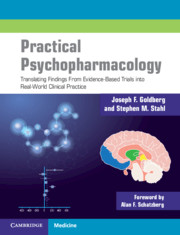 Practical Psychopharmacology
Practical Psychopharmacology Book contents
- Practical Psychopharmacology
- Practical Psychopharmacology
- Copyright page
- Dedication
- Contents
- Foreword
- Preface
- Abbreviations
- Part I General Principles
- 1 Core Concepts of Good Psychopharmacology
- 2 Targets of Treatment: Categories versus Dimensions of Psychopathology
- 3 Interpreting and Using the Literature: Integrating Evidence-Based Trials with Real-World Practice
- 4 Placebo and Nocebo Effects
- 5 Tailoring the Fit: Moderators and Mediators of Treatment Outcome
- 6 Complex Regimens and Rationale-Based Combination Drug Therapies
- 7 Laboratory Values and Psychiatric Symptoms: What to Measure, What Not to Measure, and What to Do With The Results
- 8 Pharmacogenetics: When Relevant, When Not
- 9 Cross-tapering and the Logistics of Drug Discontinuation
- 10 Managing Major Adverse Drug Effects: When to Avoid, Switch, or Treat Through
- 11 Novel Drug Therapeutics: Nutraceuticals, Steroids, Probiotics, and Other Dietary Supplements
- 12 Human Diversity and Considerations in Special Populations
- Part II Targets of Pharmacotherapy
- References
- Index
9 - Cross-tapering and the Logistics of Drug Discontinuation
from Part I - General Principles
Published online by Cambridge University Press: 19 October 2021
- Practical Psychopharmacology
- Practical Psychopharmacology
- Copyright page
- Dedication
- Contents
- Foreword
- Preface
- Abbreviations
- Part I General Principles
- 1 Core Concepts of Good Psychopharmacology
- 2 Targets of Treatment: Categories versus Dimensions of Psychopathology
- 3 Interpreting and Using the Literature: Integrating Evidence-Based Trials with Real-World Practice
- 4 Placebo and Nocebo Effects
- 5 Tailoring the Fit: Moderators and Mediators of Treatment Outcome
- 6 Complex Regimens and Rationale-Based Combination Drug Therapies
- 7 Laboratory Values and Psychiatric Symptoms: What to Measure, What Not to Measure, and What to Do With The Results
- 8 Pharmacogenetics: When Relevant, When Not
- 9 Cross-tapering and the Logistics of Drug Discontinuation
- 10 Managing Major Adverse Drug Effects: When to Avoid, Switch, or Treat Through
- 11 Novel Drug Therapeutics: Nutraceuticals, Steroids, Probiotics, and Other Dietary Supplements
- 12 Human Diversity and Considerations in Special Populations
- Part II Targets of Pharmacotherapy
- References
- Index
Summary
“Necessary clinical adjustments,” as noted in Chapter 1, come with the pharmacological territory for most patients with complex psychiatric disorders – partly because symptoms often can be protean and nonstatic, partly because illness severity can wax and wane, partly because of the impact of cotherapies, and partly from other factors such as pharmacokinetic interactions, treatment nonadherence, loss of efficacy, or other events in the natural evolution of illness. The mechanics and logistics of changing from one pharmacotherapy to another, or deciding when and how to deprescribe an ineffective or otherwise unhelpful medication, are seldom discussed in textbooks or practice guidelines. From an evidence-based perspective, there are few controlled trials designed to compare tolerability and outcomes across various methods and timeframes for stopping and starting or cross-tapering one drug in exchange for another.
- Type
- Chapter
- Information
- Practical PsychopharmacologyTranslating Findings From Evidence-Based Trials into Real-World Clinical Practice, pp. 169 - 191Publisher: Cambridge University PressPrint publication year: 2021
